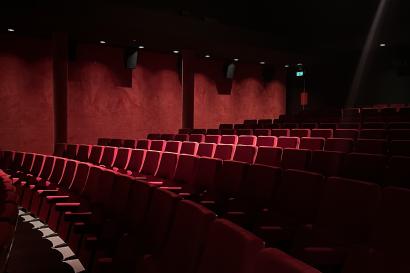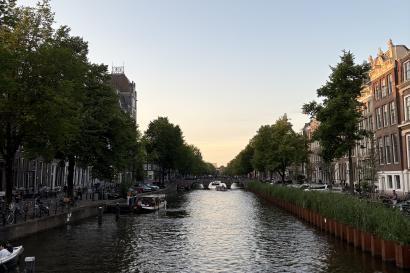American colleges everywhere love athletics. Even the small liberal arts school I attend packs the stands for a few football games every year (which is shocking given our 4-23 record over my three years of attendance). A typical Sunday will involve students galivanting across the dining hall adorning the Patriots logo from head to toe. These students then face disapproving glares or cheerful comradery from fellow students and even sometimes faculty. The chatter around the breakfast tables revolves around fantasy teams, where the draft is just as important as the first paper of the semester. Even as a member of the varsity soccer team, I found myself in conversations about NFL transfers just as much as Premier League transfers with my teammates.
Stepping off the plane at Schiphol enters travelers into a world where football takes on a new meaning. Football here is, of course, soccer, and American football is known only as “American Football” (often said mockingly with a heavy attempt at an American accent). The culture surrounding soccer here is deeply engrained into almost every individual I come across. Much like Patriots fans on a Sunday, wearing an Ajax jersey is met with the same love and hate from people regardless of age. My father, who emigrated from the Netherlands, is a lifelong supporter of Feyenoord. Feyenoord is one of the larger clubs in the Netherlands, hailing from the large harbor city of Rotterdam. Growing up in America, I consistently received jerseys, stickers, pencil cases, posters, etc., outfitted with the large “F” logo from the club. In America, it means nothing to anyone other than my family, but in the Netherlands, the same “F” instantly makes me worth teasing or befriending.
As a lifelong soccer player, the Dutch culture is more my pace. My family was a soccer family growing up — both of my parents are still soccer coaches to this day, and both my sisters and I have have been recruited to play at the collegiate level. In the Netherlands, soccer is by far the most popular and noticeable sport. While this soccer culture is excellent for a person like me, how do the Dutch feel about other sports? Firstly, hearing “hockey” in America surfaces images of ice skates and pucks, but in the Netherlands, “hockey” refers only to field hockey. Additionally, when you turn on the TV, the Dutch stations are more likely to show the snooker Masters than a basketball game.
For anyone interested in visiting the Netherlands, the one thing to understand is that the Dutch are immensely supportive of anything they have success performing. If a Dutch athlete has a chance at winning something, there’s likely a sea of fans wearing orange in the stands. In recent years, the success of Formula 1 driver Max Verstappen has led to the resurfacing of the Dutch Grand Prix to the country. Twenty-five-year-old Mathieu van der Poel has been dominating the cyclo-cross circuit and has since become a recognized name throughout the nation, despite the sport being nearly unheard of in the States.
While the colors of the Dutch flag consist only of horizontal stripes of red, white, and blue, the color orange has become synonymous with the Netherlands. Historically, the Dutch royal family belongs to the House of Orange-Nassau, first founded in 1544. The royal family, which is still prevalent in the country today, makes the color orange a symbol of Dutch pride, thus resulting in the adornment of the color throughout the country. Every April, the Dutch celebrate a day in honor of the King’s birthday, known as “Koningsdag.” On this day, the whole country dresses in orange and celebrates in the streets to demonstrate pride and affection for the Dutch royal family and the nation as a whole. If there is one day I’m excited about this semester, it’s April 27th.
Despite not having the ambition to stay up all night for the Super Bowl (which began at 12:30 am here), I still enjoyed a weekend full of soccer. The top professional soccer league in the Netherlands, known as the Eredivisie, was in full force. On Friday, I attended a match between second-place AZ Alkmaar against twentieth-place RKC Waalwijk. Much to everyone’s expectations, AZ comfortably won 4-0, but the atmosphere of the stadium left a smile on my face until Sunday. Whether an athlete, fan, or someone who couldn’t care less about sports, watching a professional match has something to offer. While tailgating is a wonderful American tradition, Dutch fans before, during, and after the match gathered in the club cantina for coffee, snacks, and live music. The jovial atmosphere within the stadium and the cantina provided a place for a community of fans to gather. Even I enjoyed speaking to some of the diehard fans about the match and the season as a whole.
Throughout the rest of the weekend, soccer matches were on almost every time I looked into a pub. When the Dutch league wasn’t in action, there were matches from the Premier League on. Many Dutch fans tuned in to see fellow Dutchmen Virgil van Dijk and Georginio Wijnaldum’s continued dominance with Liverpool and Steven Bergwijn’s debut at Tottenham (where he scored the first goal of the match against Manchester City). The soccer fanatic country of the Netherlands can certainly be a lot to take in, but for me, I found a little slice of heaven. If you love sports, especially soccer, then the Netherlands has more than enough for you to explore.

Josiah Krul
I'm Josiah. An adventurous and charismatic 20 year old from Maine. I love engaging with my creative side through outlets such as sports, travel, technology, and writing.







